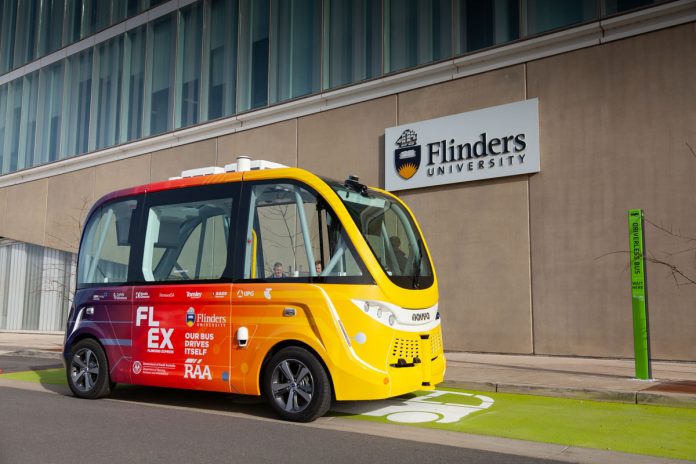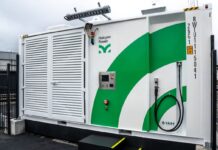
The South Australian Government is set to launch a five year public trial of Flinders University’s driverless public electric shuttle as part of a three-stage, $4 million project aimed at accelerating the introduction of autonomous vehicle technology in the State
The Flinders Express (or ‘FLEX’) will start operating around the Tonsley Innovation District this week, providing ‘first mile–last mile’ shuttle services between the nearby Clovelly Park Train Station and Tonsley’s Main Assembly Building.
Funded by the State Government through its Future Mobility Lab Fund, the French-designed Navya Arma electric shuttle can carry up to 15 passengers at speeds of up to 40 km per hour, but will travel up to 30 km per hour during the trial.
The vehicle will be docked within a six bay solar recharge garage – to be constructed near the Mitsubishi Administration building – which will also be available to the public wanting to recharge their own electric vehicles for free.
Flinders University Head of Civil Engineering Professor Rocco Zito said FLEX will be managed by an on-board chaperone informing users of the technology and ensuring safety.
“Demonstrations and trials of these driverless vehicles that involve the community are a really good way of building acceptance of this type of new technology,” the Professor continued.
“Our aim is not to prove the technology but rather expose the public to this new type of transport service and learn from their responses and reactions to help driverless vehicles gain general acceptance.”
The project – for which Flinders University, the RAA and Department of Planning, Transport and Infrastructure (DPTI) have partnered with industry supporters Cohda Wireless, Renewal SA, SAGE Automation, Telstra, UPG, ZenEnergy and public transport operator Keolis Downer – last year received $1 million from the State Government’s $10 million Future Mobility Lab Fund.
Minister for Transport, Infrastructure and Local Government Stephan Knoll described the launch of the public trial as ‘an exciting step forward for autonomous vehicle technology in South Australia’.
“Approving the exemptions for the Flinders FLEX autonomous vehicle trial was one of the first actions I undertook after taking office as Minister,” Mr Knoll remarked.
“Initially FLEX will shuttle people around the Tonsley campus integrating with the Tonsley rail station, with future plans to extend to the Bedford Park and Flinders Medical Centre campus and local public transport hubs.”
“South Australia is ahead of the curve in this space and was the first state to enact legislation to allow on-road trials of autonomous vehicles.”




















